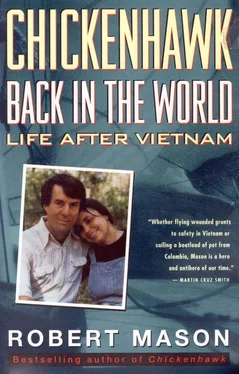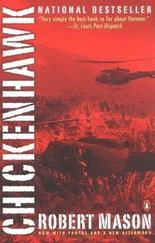Robert Mason - Chickenhawk - Back in the World - Life After Vietnam
Здесь есть возможность читать онлайн «Robert Mason - Chickenhawk - Back in the World - Life After Vietnam» весь текст электронной книги совершенно бесплатно (целиком полную версию без сокращений). В некоторых случаях можно слушать аудио, скачать через торрент в формате fb2 и присутствует краткое содержание. Год выпуска: 2013, Издательство: BookBaby, Жанр: Старинная литература, на английском языке. Описание произведения, (предисловие) а так же отзывы посетителей доступны на портале библиотеки ЛибКат.
- Название:Chickenhawk: Back in the World - Life After Vietnam
- Автор:
- Издательство:BookBaby
- Жанр:
- Год:2013
- ISBN:нет данных
- Рейтинг книги:3 / 5. Голосов: 1
-
Избранное:Добавить в избранное
- Отзывы:
-
Ваша оценка:
- 60
- 1
- 2
- 3
- 4
- 5
Chickenhawk: Back in the World - Life After Vietnam: краткое содержание, описание и аннотация
Предлагаем к чтению аннотацию, описание, краткое содержание или предисловие (зависит от того, что написал сам автор книги «Chickenhawk: Back in the World - Life After Vietnam»). Если вы не нашли необходимую информацию о книге — напишите в комментариях, мы постараемся отыскать её.
Chickenhawk: Back in the World - Life After Vietnam — читать онлайн бесплатно полную книгу (весь текст) целиком
Ниже представлен текст книги, разбитый по страницам. Система сохранения места последней прочитанной страницы, позволяет с удобством читать онлайн бесплатно книгу «Chickenhawk: Back in the World - Life After Vietnam», без необходимости каждый раз заново искать на чём Вы остановились. Поставьте закладку, и сможете в любой момент перейти на страницу, на которой закончили чтение.
Интервал:
Закладка:
“You make me feel bad, Jack. I just wrote a book about my tour, and the worst I got was the clap.”
“Hey,” he said, laughing. “Lucky for you. I don’t mind. I’m glad you wrote it. People need to know what it was like over there.”
I made a face that dismissed the compliment and shook my head. “What’s the cast for?”
Jack laughed. “Would you believe it? Baseball? Broke it sliding into third base last week. And I’m due to leave yesterday!”
“Yesterday. You serious?”
“Like a fucking heart attack. They won’t let me go until it’s healed. You believe it? I ask them what the fuck difference it makes if I go home with a cast. They say they’re responsible for my health here, and I’m not well. Can’t leave prison if you’re sick. Bastards. They’re lifers here, every one of them. I told one of my hack buddies that when I’m out of here, I’ll be thinking of him every day. I said, ‘I’m gonna spend a minute each day, take a whole minute off, just to think about this place. And I’m gonna laugh my ass off, old buddy, ‘cause you’ll still be here.’”
We talked for an hour. Jack talked about flying Hueys with infectious enthusiasm. I realized I missed them, too, missed the tough missions, the tricky flying we had to do to survive. He told me about the day he was wounded. He was flying low-level down Route 19, a road I knew, and got caught in an ambush. Two machine guns raked his cockpit, shattered his shins and knees. His copilot was killed.
Jack knew all about flying Hueys in combat. He also knew the ins and outs of Eglin. I told him I wanted to work at the school. He said that was smart. Teacher’s assistant was a piece of cake. He told me the name of a guy to go see, the same procedure we used in the Army. Everything worth doing in the Army was done outside the usual channels, through the clerks and technicians, the people who actually did the work. If you needed new boots, you made friends with the supply sergeant with a bottle of whiskey. If you wanted a leave request approved, you walked it through the chain of command’s clerks in a day. If you waited for official Army channels to process a request, you’d have gray hair first. I figured Jack was a good contact.
I settled into life at Dorm Three. I didn’t see John Tillerman much. He was in a different section, and we never got assigned to the same work details. I talked to the inmate Jack Cantrell had suggested. He explained that I was a hot property in camp, and wouldn’t have any trouble getting the job I wanted in the school. That was a relief; landscape was getting hard. We’d finished the morning talks and testing, so we worked all day. I mowed, weeded, dug—it’s not that I didn’t like this kind of work, I just didn’t like doing it all the time. I talked to the education director, Mr. Gossen, in front of the education building while I was pulling up weeds. My inmate connection had told him I wanted to be a teacher’s assistant. He said he had arranged everything.
After mail call, Barnett showed me a copy of People magazine, the September twelfth issue, with a picture of Chevy Chase on the cover.
“Yeah?” I said.
Barnett flipped it open. “Looky here. You’re in trouble,” he said, grinning.
It was a picture of me looking pissed off, standing on the porch of Dorm Three. The section was entitled trouble and the headline said: AUTHOR ROBERT MASON, JAILED FOR DRUG RUNNING, WATCHES HIS LITERARY TRIUMPH, Chickenhawk , FLY THE COOP. The headline didn’t make much sense, but Chandler’s two-page article was pretty accurate. It was a strange feeling to see me and Patience and Jack in People magazine.
I called Gerry Howard in New York the next day. He told me to call every Friday to find out how the book was doing. Phones were scattered all over the camp. The permanent dorms had one pay phone at each end, some inside and some outside. Dorm Three had phone booths on the porches on each side of the dorm. To make a call, you roamed the camp or sat in line. I called Gerry, collect, during lunch.
“To date …” Gerry paused; I could hear some paper shuffling. “Let’s see. Oh, yeah. We’ve sold twenty thousand books.” Gerry paused again. I felt a jolt of surprise. I heard Gerry laugh and then say, “Kind of beats the hell out of our prediction of five thousand, eh?”
I laughed. “Twenty thousand?”
“Yep. And we’re selling an average of a thousand a day. A day.”
I walked back to work, dazed. While I helped unload gravel from a pickup truck that we were spreading over a drainage field we’d dug, I multiplied twenty thousand times $2.50, the royalty I got for each book. It came to fifty thousand dollars no matter how often I figured it, but that couldn’t be right. I’d never dreamed I’d get that much money for the book. Fifty thousand and growing? Gerry said we were selling a thousand a day? That meant while I was here, in jail, shoveling this gravel, I was making twenty-five hundred dollars a day? I couldn’t help it, I grinned.
I started chattering with Kurt Vierthaller, another of the A&O guys. I was bubbling over with joy and took to laughing and horsing around with Kurt, knocking the gravel off his shovel and stuff. Simpson came up behind me and said, “This isn’t a fucking lark. Mason. This is prison.” I turned around and saw Simpson glaring at me. I nodded. Simpson was telling the truth. I threw a shovelful of gravel into the drainage field, but I was laughing inside.
I heard an inmate in the hall yell to someone that our permanent work assignments were posted on the bulletin board. I breezed down the hall toward the mob crowded in front of the bulletin board next to the bathroom door. The other A&O guys were pressed around the board, reading their assignments. I heard bitching and moaning. I smiled smugly. If you had your act together, like I did, you didn’t have to depend on luck. Smart people make their own luck, suckers. I stood behind the crowd and lit a cigarette. As the inmates thinned out, I moved closer to the board. I read “Mason, Robert, 81349-071 A” in the name column and followed the little dots across from it to the job column. I read “Landscape.”
I traced the dots across the page with my finger. It was landscape, no mistake.
I went to the education building and found Mr. Gossen sitting in his office. He waved me in. “What happened?” I asked.
“The superintendent. He approves all the job assignments, Bob. The staff does the picking. His signature is just a formality. But this time he was looking for yours. He saw you assigned here and denied it.”
“Is there any recourse? Can I do anything?”
Mr. Gossen shook his head. “Not really. You can go through your counselor. If you can prove your job is bad for your health or something, they can get your job changed. You have a health problem?”
“Not unless you count going fucking nuts when I see a rake.”
Mr. Gossen smiled. “I’m sorry, Bob. We were looking forward to having you around here. Bob Haldeman used to work here.”
“The Watergate Haldeman?”
“Yeah. He wrote a book. I thought it’d be nice to have had you here, too.”
CHAPTER 26
Dorm Four is mine. I am supposed to keep every blade of grass and every leaf and every lump of dirt around Dorm Four cut, arranged, and smoothed to perfection. I have tools: a bucket, a stiff push broom, a springy leaf rake, a sharp edging tool with a new hickory handle, a nice new snippy pair of shears, and—that’s it.
I start in the morning by emptying all the butt buckets at each of the four entrances. There are cigarette and cigar butts in the sand in each butt bucket and all around each butt bucket. There are wads of stuff people who chew tobacco spit into the butt buckets, gelatinous and brown. People who use tobacco are pigs.
Читать дальшеИнтервал:
Закладка:
Похожие книги на «Chickenhawk: Back in the World - Life After Vietnam»
Представляем Вашему вниманию похожие книги на «Chickenhawk: Back in the World - Life After Vietnam» списком для выбора. Мы отобрали схожую по названию и смыслу литературу в надежде предоставить читателям больше вариантов отыскать новые, интересные, ещё непрочитанные произведения.
Обсуждение, отзывы о книге «Chickenhawk: Back in the World - Life After Vietnam» и просто собственные мнения читателей. Оставьте ваши комментарии, напишите, что Вы думаете о произведении, его смысле или главных героях. Укажите что конкретно понравилось, а что нет, и почему Вы так считаете.












